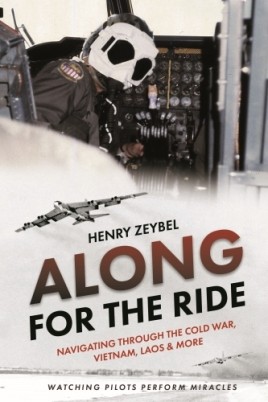Reviewed by
Grant Highland, Ph.D.
Assistant Professor, JFSC
In his book, Along for the Ride: Navigating Through the Cold War, Vietnam, Laos and More, author and retired Air Force Lieutenant Colonel Henry Zeybel, frames his Cold War experiences this way:
Writing beats going to a “shrink.” I’ve tried the two. Done properly, both take years of self-analysis and both reveal great wads of hidden knowledge . . . My aim as a writer has been to tell entertaining stories . . . Cynics claim anyone who writes for any reason other than making as much money as possible is an idiot. If that’s true, sit back and prepare to read the remembrances of a fool.
From those simple, descriptive sentences an “entertaining story” does indeed unfold. Zeybel’s story captures a period of history and an era all too quickly becoming lost to the failings of a fool’s memory and the immediacy of present impulses.

The tone of Zeybel’s memoir convincingly captures the periods of his life. As he advanced in his career, he progressed from the youthful braggadocio of his early years in the Air Force and Vietnam missions to the more measured and considerate requirements of leadership positions. Toward the end of his second career in writing, Zeybel transitions to the reflective and quasi-pensive tones of an older man tutoring college athletes. The fluid temporal structure of the book can leave the reader disoriented, but the pitch-perfect tone of voice that resonates with each of the stages of his life ground the reader in the eras. His honest depiction of the various and shifting attitudes and perspectives that constitute universal human experience of life and aging are one of the most compelling aspects of his work and create a sense of honesty that compels reading in a way missing from other memoirs.
The quality of Zeybel’s voice also creates an artistic juxtaposition against the Cold War era that evokes the unique moods associated with the geopolitical phenomena. From Desert Storm in Iraq, and then Operation Enduring Freedom in Afghanistan and Operation Iraqi Freedom in the context of a post-9/11 world, his Cold War story contrasts with the later events in an evocative way. While he avoids direct comparison between the two eras, his reflection upon both from theperspectives of his different roles offers a unique and poignant comparative lens. The first-person narrative perspective enables Zeybel to avoid analytical discourse, allowing readers to draw their own comparisons and conclusions, which feels empowering and compelling in its own right.
Zeybel’s work is especially effective as it recounts his aviation experiences. One passage captures the essence of all the other aviation anecdotes. In this excerpt, he describes a night mission over Vietnam after a surface-to-air missile (SAM) was launched on his AC-130 Spectre gunship:
“It’s coming in the ramp,” he said. “Dive. Dive.”
“Hang on,” Holley said, “we’re going down.”
Based on my instrument readings in the booth, from an altitude of 9500 feet, Holley rolled the gunship into a 135-degree bank, practically upside down, and then arced the nose earthward in a 4000-foot-per-minute dive. The maneuver was like turning over a dump truck and still steering it. Our turkey wasn’t designed for such a feat. Yet Holley did it. Maintaining a positive one-gravity load on the creaky, antiquated airframe, he plunged downward in open defiance of several laws of aerodynamics.
The pilot conducted this split-S maneuver in a high-wing, multi-engine gunship at night over mountainous terrain in hostile territory. The maneuver is breathtaking in its audacity, and Zeybel captures every pulse-pounding moment in exquisite detail. Readers with an aviation background will thoroughly enjoy the author’s riveting aerial descriptions that reek authenticity.
Zeybel notes, the book is part catharsis and part entertainment. But throughout it is an homage to a life lived and the people and places that helped shape that life. While a memoir is primarily about telling the life story of the writer, the best memoirs, if not at least timely memoirs, remind the reader about something important in their own life. In the case of Along for the Ride, that message seems to be about personal perspective and change. A person’s perspective naturally changes as they age, as they transition careers, as memory fades. In Zeybel’s case the change is framed by the global shift from the Cold War to War on Terror. The irony, in the telling, is that he struggles to remember but reminds the reader of not only the experiences but what was important from being the man in the arena. This book is for people who never forget that to those daring greatly, nothing is cold and no terror unwelcome.
Book Information:
Along for the Ride: Navigating Through the Cold War, Vietnam, Laos and More
by Henry Zeybel
Casemate Publishers, Havertown, PA, 2021, 288 pp.
The views expressed are those of the author(s) and do not reflect the official policy or position of Joint Forces Staff College, National Defense University, the Department of Defense, or the U.S. Government.
 Download the PDF version: click here
Download the PDF version: click here